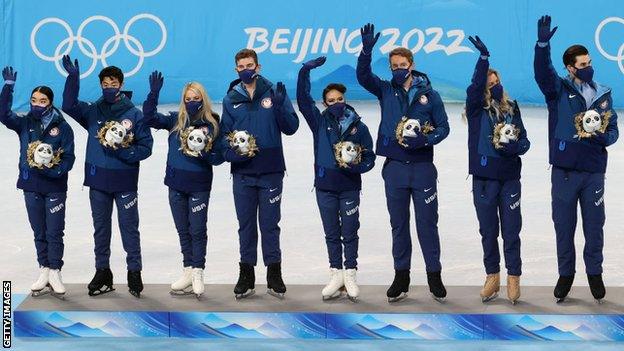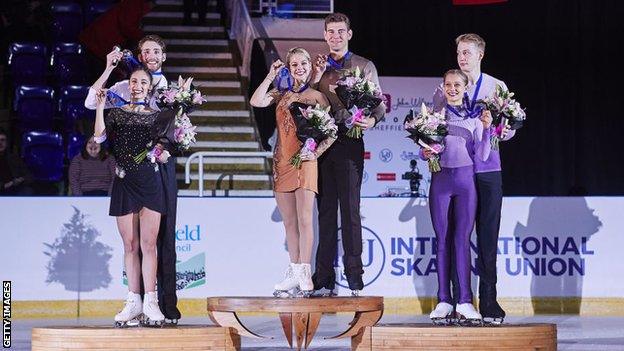Beijing 2022 medallists Alexa Knierim & Brandon Frazier's 'moment gone' as wait continues
- Published

The medallists in the Olympic team figure skating event at Beijing 2022 were given mascots at a flower ceremony but are still waiting for their medals
They know they won an Olympic medal, they just do not have it to show anyone.
And American pairs skaters Alexa Knierim and Brandon Frazier still have no idea when they will get it, just that whenever they do, nothing can never replace the moment they have lost.
The International Olympic Committee (IOC) decided not to award the medals in the team figure skating competition at Beijing 2022, pending the resolution of a doping investigation into Russian Kamila Valieva.
Nine months later, that is still pending, and the medallists are still waiting.
"We were bringing home a medal for our country, which just felt so much bigger and greater [than any other], and to go home right after the Olympics and show and tell this beautiful medal to people at home who have seen something they never thought was possible - these are the moments I wish we were able to have," Knierim, 31, told BBC Sport.
"The sad part is that nothing will be able to replicate or recreate the moment in Beijing.
"Even if we were to go back to the exact location [to receive the medals], timing is everything and that moment is gone."
They do not even know what colour the medal will be when they get it.
The World Anti-Doping Agency (Wada) is seeking a four-year ban for 16-year-old Valieva and for her to be disqualified from competitions since the failed test for angina drug trimetazidine, which would include the Winter Olympics.
Earlier this week the Court of Arbitration for Sport registered the appeal by Wada against the Russian Anti-Doping Agency (Rusada) and Valieva, with Wada concerned by the delay in resolving the case after Rusada said it was not going to make the results of its investigation public.
Valieva helped the Russian Olympic Committee (ROC) win the figure skating team competition in Beijing, with the United States second and Japan third. If the teenager is disqualified, the USA could be promoted to gold and fourth-placed Canada could be elevated to bronze.
Knierim and Frazier, 29, were on top of the podium last weekend at the Grand Prix event in Sheffield, a gold medal hanging proudly around their necks during a victory ceremony featuring anthem, flag-raising and cheers. And there were similar scenes in France when they became world champions in March.
But these are not Olympic medals.
"For a lot of elite athletes sometimes the actual trophy or medal, when you get it, goes into a drawer," Knierim said.
"This will not go in a drawer! When we do get our medals I will be sure to display mine in my home and be very proud of it whatever colour it is."
Frazier agreed he would be taking extra care of his, saying: "I'll probably wear it for a good year!"

Alexa Knierim and Brandon Frazier (centre) won gold in Sheffield on Saturday - giving them a podium moment they are still waiting for from the Olympics in February
The IOC has promised a "dignified" medal ceremony when the time comes - lawyers have suggested that could still be more than a year away - but the athletes themselves would rather have had their moment in Beijing and dealt with the fall-out of any possible stripping of medals later.
Frazier is clear that this unprecedented situation must never be allowed to happen again.
"If the committees who make these decisions care about preventing this from happening again, they need to listen to the athletes involved so they can understand first-hand what we're living through and what it felt like to have moments like this, so they understand the severity of it," he said.
The American team lodged an unsuccessful legal appeal while they were in Beijing to seek to have their medals awarded before they left the Games.
The news of Valieva's failed test came after she had competed in the team event but before the medal ceremony was due to take place. The outcome of a legal challenge also meant she was allowed to continue competing in Beijing, going on to finish fourth in the women's event which she had led before an error-strewn performance in her second routine.
The sample had been taken in December but the findings only came to light around six weeks later on the biggest stage for winter sports.
It came at a time Russia was officially banned from the Games as part of sanctions relating to state sponsored doping. Athletes from the country who were able to prove they were clean were allowed to compete under the ROC without a flag or anthem.
Knierim and Frazier may or may not be Olympic champions - but it is not even the colour of the medal that matters.
"The colour only matters when it comes down to whether the competition was fair or not. That's out of our hands, that's what the investigations are doing," Frazier said.
"It's more about we just wanted that medal and that experience at the Games, so that part was the disappointing part so now it's just about what Team USA and the other countries deserve and that's where we're at."
Knierim added: "However and wherever that may be, the athletes are just going to be grateful for the moment to hold on to their medals."